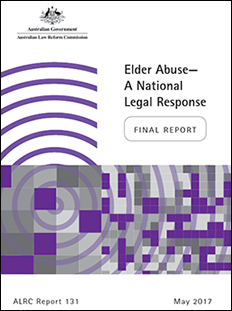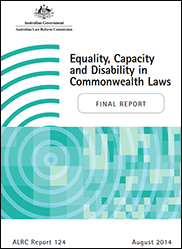11.03.2021
After an extensive two-year consultation and submission process, the Royal Commission into Aged Care Quality and Safety has published its much anticipated Final Report (‘the Aged Care Report’) in which it makes 148 recommendations aimed at improving standards of care in the aged care sector. The report is not light reading and highlights the urgent need for reform across the sector to ensure that aged care recipients are treated with care and dignity at all times.
 A number of the recommendations from the Royal Commission are not new and have been made in numerous past reports including by the Australian Law Reform Commission (ALRC) in its Elder Abuse – A National Legal Response Report (‘Elder Abuse Report’) in 2017.
A number of the recommendations from the Royal Commission are not new and have been made in numerous past reports including by the Australian Law Reform Commission (ALRC) in its Elder Abuse – A National Legal Response Report (‘Elder Abuse Report’) in 2017.
In its Elder Abuse Report, the ALRC made 43 recommendations on how Commonwealth legal frameworks could be reformed to better protect older persons from misuse or abuse in a way that safeguards their autonomy. While the Elder Abuse Report canvassed a broad range of issues facing older Australians, the report found that older people receiving aged care—whether in their homes or in residential aged care facilities—may experience abuse or neglect. Abuse may be committed against older people by paid staff, other residents in residential care settings, family members or friends. To address this abuse, the ALRC recommended a range of reforms to the aged care sector including:
- establishing a serious incident response scheme;
- reforms relating to improving the suitability of people working in aged care by enhancing employment screening processes, and ensuring that unregistered staff are subject to the proposed National Code of Conduct for Health Care Workers;
- regulating the use of restrictive practices in aged care; and
- establishing national guidelines for the community visitors scheme regarding abuse and neglect of care recipients.
The ALRC also addressed decision making in aged care and recommended that aged care laws be reformed to provide for supported decision-making approaches. This article discusses the approach adopted by the Aged Care Report in three areas that were also discussed in the ALRC Elder Abuse Report: empowering people receiving care by adopting supported decision-making approaches to care; strengthening the reporting processes around serious incidents in aged care facilities; and, introducing a nationally consistent approach to regulating restrictive practices.
Decision making
The Royal Commission endorsed the ALRC’s call for aged care laws and legal frameworks to be amended to be consistent with decision-making principles that support people to make their own decisions on the care they require. Supported decision making emphasises the ability of a person to make decisions, provided they are supported to the extent necessary to make and communicate their decisions. As such, supported decision making upholds individual autonomy and dignity when compared to substituted decision making.
Where it is not possible to ascertain the care preferences of an older person, the Royal Commission concurred with the ALRC’s view that, in such circumstances, decision making must, ‘give effect to what the person would likely want, based on all the information available, including by consulting with family members, carers and other significant people in their life’. The Commission’s views on decision making align with the ALRC’s finding that better outcomes are achieved when older people are empowered to make their own decisions rather than have decisions made on their behalf.
Serious incident reporting
Aged care residents are some of the most vulnerable members of our community with fifty-two percent of the residents suffering some form of dementia. Preventing and addressing serious incidence of harm in aged care is critical to ensuring the safety and wellbeing of all aged care recipients.
The Aged Care Report identifies that the existing compulsory reporting scheme is unsatisfactory because:
- the scope of incidents that must be reported is too limited;
- the number of reported incidents at each facility is not made publicly available; and
- reporting does not require a substantive response by providers to ensure that the incident is investigated, addressed, and the risk of repeat minimised.
The Aged Care Report supports the ALRC’s recommendation that a serious incident scheme be introduced in aged care. The report recommended that care providers be made to investigate, respond to, and take remedial action when reported incidents occur. Notably, the Government has recently introduced legislation into Parliament which, if passed, will implement some of the ALRC’s and the Royal Commission’s recommendations on how to strengthen the serious incident reporting scheme to ensure the risks of harm to older Australians are decreased.
Restrictive practices
 The Aged Care Commission heard that antipsychotic drugs, such as risperidone, and a range of sedatives, are often used by providers to manage the behaviour of residents with dementia, even when more appropriate interventions could be used that respect the dignity and autonomy of residents. A ‘restrictive practice’ is an activity or intervention that has the effect of restricting a person’s free movement or ability to make decisions. According to the Aged Care Report, the regulation of restrictive practices in aged care is lacking, and where regulation does exist, divergent regulatory approaches are taken around Australia. The regulation of restrictive practices is further complicated by the fact that different regulatory approaches are taken in the aged care and the disability sectors.
The Aged Care Commission heard that antipsychotic drugs, such as risperidone, and a range of sedatives, are often used by providers to manage the behaviour of residents with dementia, even when more appropriate interventions could be used that respect the dignity and autonomy of residents. A ‘restrictive practice’ is an activity or intervention that has the effect of restricting a person’s free movement or ability to make decisions. According to the Aged Care Report, the regulation of restrictive practices in aged care is lacking, and where regulation does exist, divergent regulatory approaches are taken around Australia. The regulation of restrictive practices is further complicated by the fact that different regulatory approaches are taken in the aged care and the disability sectors.
In 2014, the state and territory governments agreed to adopt a national approach to reducing and eliminating restrictive practices in the disability sector, which the ALRC built upon in its Elder Abuse Report and its 2014 Equality, Capacity and Disability in Commonwealth Laws Report, where it recommended that there should be a nationally consistent approach to the regulation of restrictive practices in the aged care and disability services sectors. The Aged Care Commission endorsed the ALRC’s recommendation in its Report, and stated in support that a strong, nationally consistent approach should be taken to ensure that the liberty and dignity of people receiving aged care is not compromised by restrictive practices.
Conclusion
The Royal Commissioners made wide-ranging recommendations in their Aged Care Report which incorporate many of the same themes and principles traversed by the ALRC in its Elder Abuse Report. Both reports highlight the need to treat people receiving aged care with dignity and respect and call on the Government to introduce mechanisms which empower people to make decisions about their own care.
The Aged Care Report can be found on the Royal Commission’s website. More information on the recommendations made by the ALRC relating to aged care can be found in the Elder Abuse Report.
